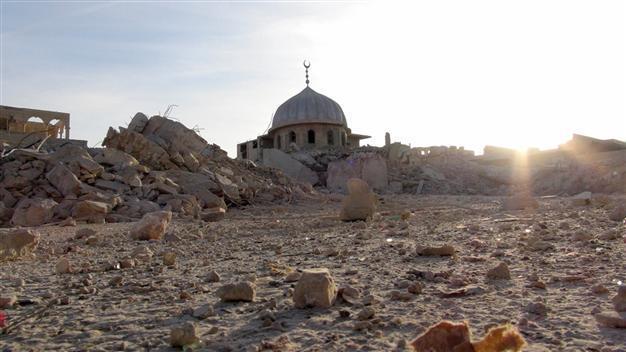Syria warplanes hit inside Damascus after general killed
DAMASCUS - Agence France-Presse

AFP photo
A Syrian fighter jet hit targets inside Damascus for the first time today, a watchdog said, as air strikes pounded rebel bastions around the country and an air force general was shot dead.
The warplane dropped four bombs on the eastern Damascus neighbourhood of Jobar, near the opposition-held suburb of Zamalka, where rebel fighters were in fierce clashes with regime troops, the Syrian Observatory for Human Rights said.
There were no immediate reports of casualties.
Only helicopter gunships had previously been used to strafe areas inside the capital, said the Observatory's director, Rami Abdel Rahman.
An AFP journalist there said the bombing could be heard across the city.
The strike, and more raids around the country, came as state television reported that a Syrian air force general had been assassinated in Damascus.
"As part of their campaign to target national personalities and scientists, armed terrorist groups assassinated Air Force General Abdullah Mahmud al-Khalidi in the Damascus district of Rukn al-Din," state television said, using the regime term for armed rebels. It gave no further details.
The general was a member of the Syrian Air Force command and was shot dead on Monday evening as he left a friend's home, a security source in Damascus told AFP on condition of anonymity.
The regime has intensified air strikes against rebel-held areas in recent days, with more than 60 raids on Monday, the most in a single day so far, the Observatory said.
On Tuesday, air strikes hit rebel bastions around Damascus including the town of Douma, where the Observatory said large numbers of people were killed or wounded.
The northwestern town of Maaret al-Numan, seized by rebels earlier this month, was also hit, with seven civilians killed including four children, it said.
Regime forces have been battling with rebels for weeks for control of the town, which is on a key supply route between Damascus and the northern city of Aleppo.
Tuesday also saw clashes between rebels and troops backed by Palestinian fighters at the Yarmuk Palestinian camp, home to 148,500 people, near Damascus.
Anwar Raja, spokesman for the pro-regime Popular Front for the Liberation of Palestine-General Command, said its forces clashed for about an hour with rebels trying to infiltrate the camp but that there were no casualties.
There are more than 510,000 Palestinian refugees living in Syria, and their leadership is largely supportive of President Bashar al-Assad's regime.
At least 36 people, including 22 civilians, were killed in fighting on Tuesday, the Observatory said.
With UN-Arab League envoy Lakhdar Brahimi due in China in a bid to revive struggling peace efforts, Qatari Prime Minister Sheikh Hamad bin Jassem al-Thani said the international community's failure to halt the fighting was making it complicit in the violence.
"What is happening in Syria is not a civil war but a war of extermination against the Syrian people," he told Al-Jazeera television.
The war, he charged, was being waged "with a licence to kill, endorsed firstly by the Syrian government and secondly by the international community." On the first day after the Eid al-Adha Muslim holiday, which saw a ceasefire bid collapse amid renewed clashes, car bombings and air strikes, the Observatory said more than 500 people had died in fighting over its four days.
The Britain-based group relies on a countrywide network of activists, lawyers and medics in civilian and military hospitals, and says its tolls take into account civilian, military and rebel casualties.
Brahimi was due in China after visiting Moscow on Monday and saying the situation in Syria "is bad and getting worse." Diplomats say he is to go to the UN Security Council in November with new proposals following his visits to Russia and China -- which have repeatedly vetoed resolutions threatening action against Assad's regime.
The uprising, which began in March 2011 as a peaceful movement, has steadily militarised after being met with brutal state repression and has left more than 35,000 people dead, according to rights groups.
Most rebels, like the population, are Sunni Muslims in a country dominated by a minority regime of Alawites, an offshoot of Shiite Islam.
